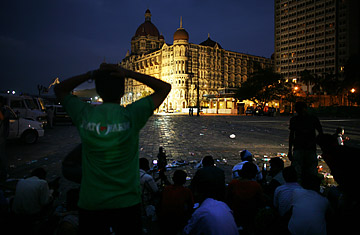
Onlookers wait outside the Taj Mahal hotel during an armed siege on Nov. 28
The siege of Mumbai may be over, but the political casualty count is mounting. As senior ministers resign their posts in the face of public outrage over what many see as the authorities' inability to protect the country from terrorist attacks, India's political parties are girding themselves for an election year that promises a bruising battle over security. The local media may have branded the storming of some of Mumbai's most iconic sites as "India's 9/11," but the nonpartisan unity displayed by U.S. politicians in the wake of the 2001 attacks is nowhere to be seen in India's political arena. And Indian TV is blaring a chorus of public anger and recrimination, much of it directed at the country's bickering political classes.
Sunday's resignation by Home Minister Shivraj Patil — who was already under pressure over the series of bombings that hit India's cities earlier this year — was followed by that of R.R. Patil, Home Minister of Maharasthra, the state of which Mumbai is the capital. R.R. Patil had been widely denounced for telling reporters on Saturday that the attacks were a "small incident that could happen in big cities." The state's Chief Minister, Vilasrao Deshmukh, was next in the firing line, lambasted on television and even by fellow politicians for insensitivity after he was seen blithely touring the burned Taj Mahal hotel with a movie director. Deshmukh tendered his resignation to the ruling Congress Party, with which he is affiliated, and will likely be replaced this week. More heads are expected to roll in the coming days. (See pictures of Mumbai the morning after the siege.)
But sacrificing a handful of top officials may not save the Congress Party and its allies from a drubbing at the state polls. The opposition Hindu-nationalist Bharatiya Janata Party (BJP) has leaped at the opportunity to leverage the threat of Islamist terrorism and government security failures to its advantage as voters prepare to go to the polls in key state elections later this month. Just days after the terrorists occupied ritzy hotels and killed some 195 people, the BJP printed posters in New Delhi proclaiming itself to be the party that would have prevented such attacks. The turnout for state polls in New Delhi on Nov. 29 was considerably higher than expected. When India's Prime Minister, Manmohan Singh, chaired an all-party crisis meeting this weekend to discuss the nation's security situation, his direct rival in the BJP, the 82-year-old L.K. Advani, failed to show up because he had duties campaigning in the western state of Rajasthan.
Advani's move drew criticism from India's press, but the Congress Party may yet suffer. Results in New Delhi are awaited, while more elections follow later this week in Rajasthan and the vast central state of Madhya Pradesh. Defeats for the ruling party now would augur poorly for general elections, to be held next May. "We may take a beating," says Congress Member of Parliament Milind Deora, who represents the affluent South Mumbai constituency, which bore the brunt of the terrorist attacks last week. The ruling party replaced outgoing Home Minister Patil with the much-respected Finance Minister P. Chidambaran. But like the government's proposal on Monday to recruit 500 new commandos to an élite counterterrorism unit, the reshuffle seems a little too late.
Still, despite the BJP's rush to seek political advantage from the government's failings in Mumbai, it remains unclear how much traction the opposition party and its allies can gain. During their last term in power, some of the worst religious riots India has ever experienced occurred in the state of Gujarat in 2002, leaving thousands dead. A year before that, an audacious terrorist attack had seen MPs come under fire inside India's Parliament building. Some of the BJP's right-wing allies, such as the Shiv Sena, an influential Hindu-nationalist party in Mumbai, have a reputation for unleashing thuggery as standard political practice and, until last week, the specter of "Hindu terror" had been in national headlines following explicit threats by nationalist leaders and revelations that Hindu extremists had been behind a wave of terrorist attacks initially blamed on Muslims. "What would they have done had they been in power [during last week's attacks]?" asks MP Deora. The BJP reaction, he suspects, could have fanned religious extremism and deepened inter-communal hostility in the country, further imperiling security.
"Everyone is smart enough to know the BJP didn't exactly cover itself in glory when it was in power," says Manoj Joshi, a prominent journalist. If they benefit from the situation, reckons political analyst Jyotirmaya Sharma, "it will not be because [the BJP] has done something right, but because the Congress has done everything wrong."
The prevailing mood suggests that both parties may be on slippery ground in a country frayed by the ravages of terrorism. The slogan for NDTV's round-the-clock coverage declares "Enough Is Enough," and many see that message as extending to politicians. When controversial BJP leader Narendra Modi offered monetary compensation to all the families of security personnel killed in action in Mumbai, he was firmly rebuffed by the wife of the city's slain antiterrorism chief Hemant Karkare. When the state of Kerala's Chief Minister, a member of the Communist Party, went to pay his respects to the family of a fallen commando on Sunday, he was barred from entering the house by the soldier's father. These moments of anger convey a growing public sentiment that the security crisis demands an end to the cynical games of Indian politics. "When the anger and hysteria subsides, questions of governance will come to the forefront," says Sharma. "Whoever fails to deliver will have to go."
— With reporting by Madhur Singh / Mumbai
